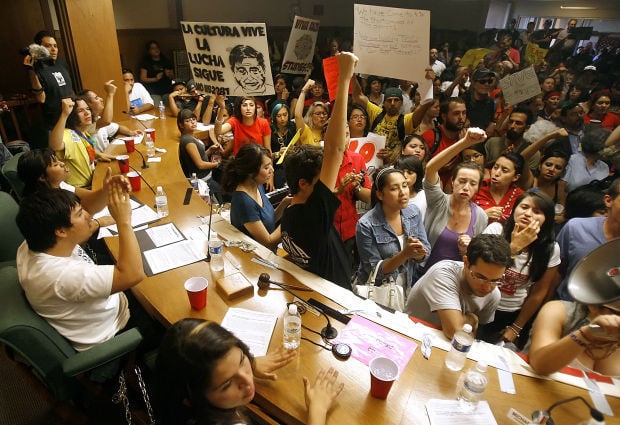PHOENIX — Saying there is evidence of racial animus by state officials, a federal appeals court on Tuesday agreed to give challengers a chance to void state laws specifically designed to kill TUSD’s “ethnic studies” program.
A trial judge was wrong in dismissing the claims by supporters of the Mexican American Studies program that both the 2010 law and how it was enforced by top state officials violated the constitutional rights of students, said Judge Jed Rakoff, writing for the majority.
Rakoff cited statements of lawmakers and others that he said suggest the statute was enacted for discriminatory reasons.
He also said it appears the law improperly and illegally interferes with the rights of students to get information.
And Rakoff rejected arguments by attorneys for the state that it is not to blame for the demise of the program.
He acknowledged the board of the Tucson Unified School District voted in 2012 to scrap the program. But Rakoff said that occurred only after John Huppenthal, then the state’s schools chief, threatened to withhold more than $14 million in state aid unless the school not only complied with the law but proved that all instruction materials had been removed from classrooms.
Less clear is what will happen if challengers ultimately win in court.
The district still has a form of what has been described as “culturally relevant curricula.” State schools chief Diane Douglas determined earlier this year that what’s left complies with the 2010 law.
But attorney Richard Martinez, who represents challengers, said Douglas’ blessing is hardly a victory.
“You have at best what you’d call a neutered program that lacks the essentials that made the program so successful,” he said. Martinez said that’s why the law needs to be voided.
“It’s essentially the right of a school district such as TUSD to have developed and then adopted Mexican-American studies for very specific reasons to address the achievement gap (and) to address the drop-out rate,” Martinez said.
Douglas, in a prepared statement, said she supports the 2010 law. Douglas, however, also said she is working on plans for “an inclusive education experience” for all students, one that will make the 2010 law and challenges to it “archaic.”
But if the law is eliminated, it frees TUSD — and any other school district — to enact programs beyond what Douglas finds acceptable.
The program, which goes back as far as 1998, was designed to provide culturally relevant curriculum for students by incorporating historical and contemporary Mexican-American contributions into classroom studies.
It came under fire in 2007 when a group of students walked out on a speech by Margaret Dugan, then the deputy state school chief. She was responding to a controversial speech where labor activist Dolores Huerta told students that “Republicans hate Latinos.”
That got the attention of Tom Horne, then her boss, who became one of the proponents of the 2010 law.
It prohibits courses that promote the overthrow of the federal government, promote resentment toward a race or class of people, are designed primarily for pupils of a particular ethnic group, or “advocate ethnic solidarity instead of the treatment of pupils as individuals.”
Various students and teachers filed suit claiming the law violates their constitutional rights.
Rakoff said there is a basis for such a claim.
“The state may not remove materials otherwise available in a local classroom unless its actions are reasonably related to legitimate (educational) concerns,” he wrote. And he said students have a right to receive information.
Here, Rakoff said, the law “threatens to chill the teaching of ethnic studies courses that may offer great value to students — yet it does so without furthering the legitimate pedagogical purpose of reducing racism.”
The judge also said the events leading up to adoption of the law “suggest an intent to discriminate.”
For example, he said, the hearings on the legislation focused not on the broader question of educational goals but solely on the Mexican-American Studies program. And he said that Rep. Steve Montenegro, R-Litchfield Park, said the program was creating “racial warfare.”
Rakoff also noted that Huppenthal, while a state legislator, not only had a role in crafting some provisions of the law but campaigned for state school superintendent with a pledge to “stop La Raza” if elected.
More concerning, the judge said, is that after Huppenthal was elected he commissioned Cambium Learning to determine if TUSD was in violation of the law.
“The auditors did not observe any evidence that Mexican-American Studies courses promoted resentment towards a race or class of people, nor that they were necessarily designed for pupils of a particular ethnic group, as all students were welcomed into the program,” Rakoff wrote. “Nevertheless, in one of the most telling actions in this entire saga, Huppenthal then rejected the conclusions of the Cambium study that he himself had commissioned, concluding that because the MAS department was aware of the audit ‘naturally the auditors are never going to observe the promotion of racism or ethnic solidarity.”
Instead Huppenthal ordered a separate investigation which reviewed only some course materials and the program’s web site, concluding from that the district was in violation of the law.
Rakoff said it will now be up to a trial judge to determine if Huppenthal rejected the initial report based on deficiencies “or whether it was based on a predetermined intent” to find the program in violation of the law.
Appellate Judge Richard Clifton said he could not go along with the majority’s conclusion that there was sufficient evidence presented to suggest enactment and enforcement of the statute was motivated, at least in part, by an intent to discriminate.
“The majority opinion conflated antipathy toward Tucson’s Mexican-American Studies program with animus toward Mexican Americans more generally,” Clifton wrote. “They are not the same.”
He said the evidence shows that state officials targeted the program and not Latino students, teachers or community members who supported or participated in the program.
“The majority opinion ignores that distinction,” he said.





